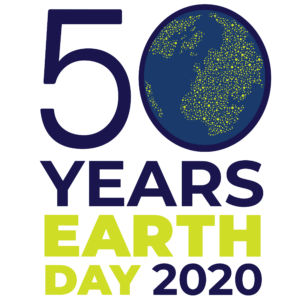 The 50th anniversary of Earth Day on April 22 is upon us. Fifty years of raising awareness about our stewardship of this beautiful – yet profoundly threatened – planet. Five decades of advocacy – working for environmental protection laws, amplifying scientific alarms, marching, praying and preaching and even striking on behalf of climate justice.
The 50th anniversary of Earth Day on April 22 is upon us. Fifty years of raising awareness about our stewardship of this beautiful – yet profoundly threatened – planet. Five decades of advocacy – working for environmental protection laws, amplifying scientific alarms, marching, praying and preaching and even striking on behalf of climate justice.
“The world economy does not have to be destroyed in order to make changes that will ensure a better environmental future.”
Is it irony, karma or poetic justice that this Earth Day arrives in the midst of a horrendous global pandemic?
We have made some progress in the past 50 years toward an environment that protects and sustains all of God’s creation, including the most vulnerable plant and animal species and the poor and marginalized persons in our communities. New laws were enacted to limit harmful pesticide use (such as DDT) and to help keep our water and air clean. Yet in a flash our world – at least here in the United States – has likely changed forever.
COVID-19, a virus affecting millions of people in almost every part of the world, is rampant, with over 41,000 deaths in this country alone – a figure that will continue to rise. At the same time, wars continue around the world. A devastating locust plague has struck eastern Africa. Hundreds of emaciated Rohingya refugees, who fled crowded and squalid camps made even worse by the threat of COVID-19, faced death from starvation and exposure as their boats sat adrift, denied entry to Malaysia. A massive typhoon hit several South Pacific island nations, causing extensive damage. Multiple earthquakes have occurred around the globe. Parts of the U.S. have experienced record heatwaves.
In America, this pandemic and the ongoing climate crisis are eerily similar at nearly every level:
- The vulnerable and marginalized are the most profoundly affected due to poor health, lack of resources and the inability to influence the decision makers and policy makers.
- Scientific expertise is disregarded in some political circles and attacked by others, including censure from government and disparaging remarks from conservative media outlets.
- Faith communities are sending mixed messages, ranging from actions of hope and encouragement to absolute denial and even anger at any perceived infringement on individual and religious rights.
- Instead of providing leadership, the current administration has instead been slow to act, promulgated conspiracy as fact, fomented anger and hatred and stoked divisiveness. Meanwhile, it has worked behind the scenes to undo much of the environmental progress made in the past 50 years – rolling back many air and water quality rules, limiting dissemination and use of scientific research and declining to enforce existing pollution laws.
- In many if not most cases, responses to both crises are polarized along party lines.
- The president and other politicians – joined, sadly, by many conservative evangelical leaders – resort to blaming and scapegoating others without taking responsibility for failures to respond to either crisis.
- At the same time, many people care deeply about others and the world we inhabit. Many are willing to sacrifice their time, their financial resources, their health and even their lives.
- Though it may not be readily apparent to some, the need to act quickly and proactively in both cases is desperately needed.
- Meanwhile, tragedy, death, mourning and anger permeate our lives.
Both the global pandemic and the worldwide environmental crises affect all of us – but not all of us equally – and with catastrophic effects that will be felt for generations to come. Indeed, one area that is definitely not the same with this pandemic and our current climate crises is the potential for economic impact. The world economy does not have to be destroyed in order to make changes that will ensure a better environmental future. Transformation of our power grids and fossil fuel consumption, adoption of new construction models, comprehensive recycling and encouragement of new modes of transport can all be put into place without sacrificing our economy. In many areas, these changes have already been shown to have positive economic effects.
What is required, however, is the will and the consensus to act across the political spectrum, something that is sadly lacking in our country.
 The Revised Common Lectionary used by many churches around the world recently included a much-sermonized passage in John 20 – the story of “Doubting Thomas.” The theological lesson from this familiar story of the apostle and his interactions with the risen Christ is that followers of Jesus must have faith without first seeing.
The Revised Common Lectionary used by many churches around the world recently included a much-sermonized passage in John 20 – the story of “Doubting Thomas.” The theological lesson from this familiar story of the apostle and his interactions with the risen Christ is that followers of Jesus must have faith without first seeing.
This passage, however, is also about accepting the truth that someone can be resurrected yet still wounded at the same time. Jesus appears before his disciples in his resurrected form – not perfectly healed but instead still bearing the scars of the nails driven into his hands and the spear thrust into his side.
We humans and the world we inhabit are wounded, deeply; yet at the same time there is resurrection and transformation. With Earth and humanity so wounded and filled with scars that we may not yet see – with the climate crisis, COVID-19, extinction of species, toxic oceans, racial and economic injustice, refugees, poverty, hunger and more – our calling as Christians is urgent: to care for all creation in its beauty, its bounty and its woundedness.
The people of Dominica, a small island in the Caribbean, have decided to become the world’s first climate-resilient nation. How did they get to this point? Their country was almost destroyed by Hurricane Maria in 2017. In the midst of a national crisis, they joined together to take a different path for their future.
What is it going to take for America to take a different course going forward? It means beginning NOW to create a “new normal,” refusing to go back to the world before COVID-19. America’s religious communities can lead the way. For Christians, our experience of resurrection and death transformed into new life – even one with the scars of our woundedness – can guide and motivate us.
We have the opportunity to make the world safer, more peaceful, healthier, kinder. The choice is ultimately in our hands.
“Is it irony, karma or poetic justice that this Earth Day arrives in the midst of a horrendous global pandemic?”
So, on Earth Day 2020, decide to plant some trees. Vote for local, state and national leaders who have put the environment first. Keep caring. Take time to learn about the communities most affected by the climate crisis both locally and around the world. Trust scientists (many of whom are devoted people of faith).
Don’t doubt all the scars; instead do your part to stop more wounds from being inflicted on humanity and all of God’s creation. The hope of Christ through the personal transformation claimed by Christians everywhere needs to be seen once again throughout creation, re-igniting a sense of wonder and responsibility for the world to which we are all intrinsically bound.
Read more BNG news and opinion on this topic:
#intimeslikethese
